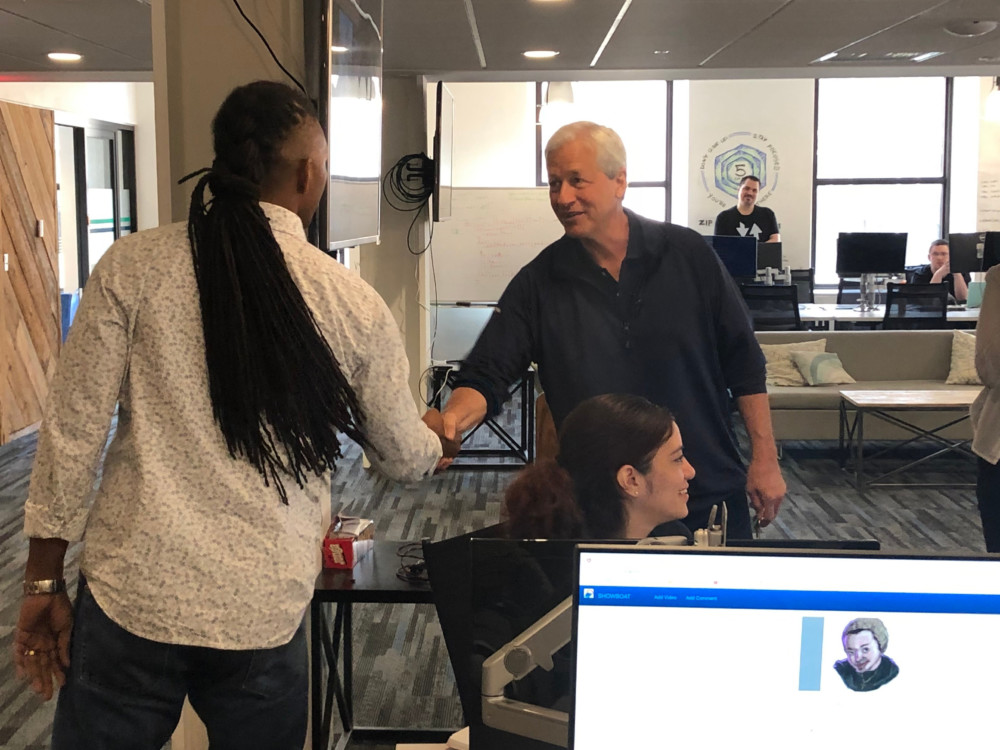By Erin Arvedlund
The Philadelphia Inquirer
WWR Article Summary (tl;dr) Launched in 2015, “Zip Code Wilmington” has trained just over 300 coders and JPMorgan has hired roughly 135 of the grads into software engineering positions.
The Philadelphia Inquirer
JPMorgan chief executive Jamie Dimon paid a visit to Wilmington, Del., on Monday to visit the bank’s extensive corporate offices, glad-hand among the state’s 11,000-strong workforce in a town hall meeting, and take in a coding boot camp it funds called Zip Code Wilmington.
That last group trains computer coders in a 12-week, $12,000-tuition program to educate potential workers for JPMorgan, which has roughly 250,000 employees globally.
Students either completed college or dropped out and pivoted to software as a way to earn an average of $74,000 upon graduation, according to Zip Code officials.
Dimon sat down with The Inquirer to elaborate on why he’s going on his 10th annual bus tour of the bank’s East Coast operations, including Philadelphia, Boston, and Washington, and his views on the economy.
“I’d love to see other coding programs around the country, and see the economics of it. With the total cost, the companies reimburse almost all of it,” he said after touring Zip Code Wilmington. The school charges $3,000 upfront, and if the students are hired by corporate partners, the companies reimburse the remaining $9,000 in tuition.
“We do other coding projects in other cities, and it should be replicated,” he said.
Dimon expounded on student loans and college unaffordability.
“Half the kids who start college don’t finish, and the average kid takes six years. Is that system working? High schools should be training for jobs.”
“Is it true that a lot of kids have student loans they can’t handle? That’s true. Is it true they should all be forgiven? Of course not.
“I graduated business school owing $30,000 from Harvard Business School. If you’re paying for good education, it is a good investment. So there should be forgiveness, but not for those who got what they wanted, who got a job. But there are those who got loans they shouldn’t have taken, they never finished, and that’s a problem. Yes, you should have some form of forgiveness.”
“The federal government took on all student lending without … any underwriting, instead of saying who is this for, discipline around who gets the loan. The government should have done it right.”
Out of $1.6 trillion in student debt currently outstanding, “we estimated that $200 billion to $300 billion of that is already bad,” Dimon said. That debt is keeping young people from buying homes, he said.
“The colleges need to take more responsibility for getting the kids out in four years or less. Let’s get it down to three years. When you get out, you have a livelihood, too. You go to college, have a coding class that counts for a certificate. You have a degree people know will be paid $70,000.”
What about the last round of rate cuts and the economy?
“This is the most prosperous economy the world has ever seen. The notion that we’re in terrible shape is completely wrong. Are there problems? Are we doing less well? That’s clearly true.”
On the Fed’s recent rate cut, “it barely makes a difference to the U.S. economy. It’s all about psychology. The economy’s doing fine, the consumer side is doing quite well. Wages are going up. The balance sheet, in general, is in good shape other than student lending,” which totals $1.6 trillion versus $10 trillion in mortgages.
“The business side is getting worse, and it’s all around trade. You see capex (capital expenditures) coming down, you see confidence dropping dramatically, not below the median, but it’s coming down,” he said, due to Brexit, Hong Kong riots, and the U.S.-China trade war.
“We’re damaging people’s confidence that there’ll be a trade deal at all. There are legitimate issues with China, it’s better for the world if we have a trade deal that fixes the legitimate interests of the U.S. But in the business world, people are saying ‘I don’t know if I should … (extend) my supply line anymore, I’m going to wait.’ It only takes a handful” of businesses before it affects the economy.
Dimon toured the fourth-floor offices of Zip Code Wilmington at co-working space the Mill and spoke with alums of the program who now work at JPMorgan.
Launched in 2015, Zip Code Wilmington has trained just over 300 coders and JPMorgan has hired roughly 135 of the grads into software engineering positions. Other companies also fund the program and hire trainees, including Capital One, Bank of America, BlackRock, Comcast, Wilmington Trust, and TD Bank.
The job placement rate of Zip Code graduates is 93%, and trainees on average increased salaries from $33,778 to $74,134. Also, Zip Code Wilmington has reskilled 185 incumbent JPMorgan employees to take software engineering positions.
Ajulu Adigwe, 24, who just graduated from University of Pennsylvania with a psychology degree, participated in a hackathon at Penn through FemmeHacks her senior year. While working part-time at Children’s Hospital of Philadelphia, she took Zip Code’s 12-week course.
“I’d like to work as a software developer for a year” and marry the psych and software backgrounds, she said. She’s applying at Comcast and other employers in Philadelphia.
Justin Haas, 25, attended University of Delaware and after realizing college wasn’t for him, signed up for Zip Code Wilmington.
“It’s a 21st-century version of a trade school, and I found it fascinating,” said the 2017 graduate and current JPMorgan employee. “I really learned by doing, and the tech skills landed me the job.”
___
Distributed by Tribune Content Agency, LLC.














































































































































































































































































































































































